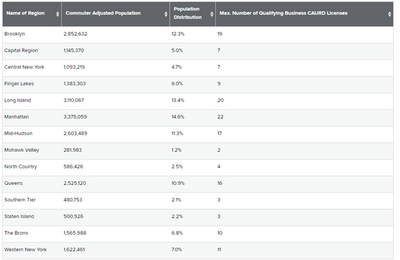By Ramsey Chamie
By Ramsey Chamie and Daniel Shortt
On November 10, 2022, a federal judge temporarily stopped the Office of Cannabis Management (OCM) from issuing conditional adult-use retail dispensary (CAURD) licenses in certain parts of New York. The reason: the CAURD application contained NY residency requirements that may violate the U.S. Constitution (specifically, a court-created doctrine called the “dormant commerce clause”). A copy of the full decision is availablehere.
CAURD LICENSES
OCM plans to issue 150 CAURD licenses to qualifying applicants. A CAURD licensee will be able to operate an adult-use recreational cannabis retail store in the state of New York. The CAURD application window closed in September, but OCM has not issued any CAURD licenses yet.
OCM divided the state of New York into regions and plans to issue a specific number of CAURD licenses in each region. In their applications, CAURD applicants ranked their top 5 regions.

CAURD APPLICATION REQUIREMENTS
TheCAURD Regulationsinclude New York residency requirements. For example, an applicant must demonstrate “a significant presence in New York State, either individually or by having a principal corporate location in the state.” Also, qualifying CAURD applicant (or their parent, guardian, spouse, child, or dependent) must also have been “convicted of a marihuana-related offense in New York State” before March 31, 2021 (There are other NY-specific CAURD requirements, but we don’t need to go through them all here.)
VARISCITE LAWSUIT
CAURD applicant Variscite NY One, Inc. is 51% owned by an individual with a cannabis conviction in Michigan (and not New York). Variscite selected as its five preferred regions the Finger Lakes, Central New York, Western New York, Mid-Hudson, and Brooklyn.
In September, Variscite sued the state of New York on grounds that the CAURD rules are unconstitutional. Specifically, Variscite claims that the CAURD rules violate the “dormant commerce clause,” a court-created legal doctrine that is grounded in the Constitution’s Commerce Clause.
In a previousGreen Light Law Blog post, we summarized the dormant commerce clause as follows:
The U.S. Constitution contains a passage, commonly referred to as the “Commerce Clause,” which provides that “Congress shall have Power . . . to regulate Commerce . . . among the several States[.]” The U.S. Supreme Court has long interpreted this clause to include a corollary or “dormant” Commerce Clause which has the effect of prohibiting states from enacting laws inhibiting trade among the states.
In a recent case, Tennessee Wine and Spirits Retailers Association v. Thomas, decided in 2019, SCOTUS invalidated a two-year residency requirement for Tennessee retail liquor stores. In applying the DCC to case at hand, the Court wrote “if a state law discriminates against out-of-state goods or nonresident economic actors, the law can be sustained only on a showing that it is narrowly tailored to advance a legitimate local purpose.” SCOTUS determined that “Tennessee’s 2-year durational-residency requirement plainly favors Tennesseans over nonresidents, and found that the law was not “narrowly tailored” to advance a legitimate local purpose and invalidated Tennessee’s residency requirement as unconstitutional.
Put simply, the Constitution grants the federal government jurisdiction over any interstate commerce and if a state law or regulation prohibits or prevents interstate commerce by favoring its residents over the residents of other states, it violates the Constitution.
COURT FINDS NEW YORK RESIDENCY REQUIRMENT LIKELY UNCONSTITUTIONAL
In a 29-page decision, the Honorable Gary L. Sharpe of the United States District Court for the Northern District of New York granted Variscite’s motion for a preliminary injunction. Variscite essentially asked the court to stop OCM from issuing CAURD licenses in five geographic areas where it applied, while the lawsuit was pending. Court’s do not issue preliminary injunctions lightly because it requires the court to act before each party has the opportunity to make its case at trial. A plaintiff seeking an injunction must meet several criteria, including their likelihood of success on the merits. As such, the court’s analysis in this case began with the question of whether Variscite was likely to succeed on the merits of its dormant commerce clause argument.
In evaluating a dormant commerce clause challenge, a court first evaluates whether the challenged law discriminates against interstate commerce in favor of intrastate commerce or whether it regulates evenhandedly. The court determined that requiring CAURD applicants to demonstrate a significant presence in New York will have a “discriminatory effect on out-of-state residents.” When a law or regulation has such an effect, it can only survive a legal challenge if it is “narrowly tailored to advance a legitimate local purpose.” It turns out that this was all that was required because, according to the court, OCM “not even attempt” to explain how its rules are narrowly tailored. When asked directly by the court, “defendants offered no cogent response.”
This is surprising. Whether or not you agree with OCM’s CAURD requirements, they should be able to at least develop several arguments as to WHY those regulations are narrowly tailored so not to violate the dormant commerce clause. After establishing a likelihood to succeed on the merits, Variscite succeeded in meeting the other criteria necessary to obtain a preliminary injunction in the geographic areas it applied.
BOTTOM LINE
New York regulators have made it a priority to issue CAURD licenses before the end of the year. While this preliminary injunction could be overturned and is limited to five geographic areas, it does not bode well for New York’s timeline. It could also open the door to other challenges to New York’s cannabis residency requirements.
We’ll continue to monitor this case and report as it develops.
You can reach Ramsey Chamie and Daniel Shortt at (917) 764-4896 or info@gl-lg.com.
This news article is intended for educational purposes only and is not intended to give legal advice. If you are seeking legal advice on the subject please consult one of our New York licensed attorneys:Perry Salzhauer,Ramsey Chamie,orBrittany Adikes.


















